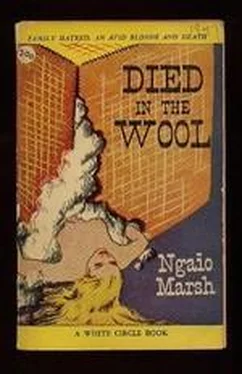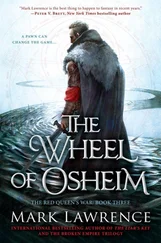Ngaio Marsh - Died in the Wool
Здесь есть возможность читать онлайн «Ngaio Marsh - Died in the Wool» — ознакомительный отрывок электронной книги совершенно бесплатно, а после прочтения отрывка купить полную версию. В некоторых случаях можно слушать аудио, скачать через торрент в формате fb2 и присутствует краткое содержание. Жанр: Классический детектив, на английском языке. Описание произведения, (предисловие) а так же отзывы посетителей доступны на портале библиотеки ЛибКат.
- Название:Died in the Wool
- Автор:
- Жанр:
- Год:неизвестен
- ISBN:нет данных
- Рейтинг книги:4 / 5. Голосов: 1
-
Избранное:Добавить в избранное
- Отзывы:
-
Ваша оценка:
- 80
- 1
- 2
- 3
- 4
- 5
Died in the Wool: краткое содержание, описание и аннотация
Предлагаем к чтению аннотацию, описание, краткое содержание или предисловие (зависит от того, что написал сам автор книги «Died in the Wool»). Если вы не нашли необходимую информацию о книге — напишите в комментариях, мы постараемся отыскать её.
Died in the Wool — читать онлайн ознакомительный отрывок
Ниже представлен текст книги, разбитый по страницам. Система сохранения места последней прочитанной страницы, позволяет с удобством читать онлайн бесплатно книгу «Died in the Wool», без необходимости каждый раз заново искать на чём Вы остановились. Поставьте закладку, и сможете в любой момент перейти на страницу, на которой закончили чтение.
Интервал:
Закладка:
“Mrs. Johns,” Alleyn began, “what sort—” He stopped short, feeling that he could not repeat once more the too-familiar phrase. “Did you like Mrs. Rubrick?” he said.
For the first time she looked sharply at him. “Like her?” she said unwillingly. “Yes, I suppose I did. She was kind. Always the same to everyone. She made mistakes as I well know. Things didn’t pan out the way she reckoned.”
“With Cliff?”
“That’s right. There’s been a lot of rubbish talked about the interest she took in my boy. People are funny like that. Jealous.” She passed her roughened hand over her face with a movement that suggested the wiping away of a cobweb. “I don’t say I wasn’t a bit jealous myself,” she said grudgingly. “I don’t say I didn’t think it might make him discontented like with his own home. But I saw what a big thing it was for my boy and I wouldn’t stand in his light. But there it is. I won’t say I didn’t feel it.”
She said all this with the same air of antagonism, but Alleyn felt a sudden respect for her. He said: “But this feeling didn’t persist?”
“Persist? Not when he grew older. He grew away from her, if you can understand. Nobody knows a boy like his mother and I know you can’t drive Cliff. She tried to drive him and in the finish she set him against her. He’s a good boy,” said Mrs. Johns coldly, “though I say it, but he’s very unusual. And sensitive.”
“Did you regret taking her offer to send him to school?”
“Regret it?” she repeated, examining the word. “Seeing what’s happened, and the cruel way it’s changed him—” She pressed her lips together and her hands jerked stiffly in her lap. “I wish she’d never seen my boy,” she said with extraordinary vehemence and then caught her breath and looked frightened. “It’s none of his doing or of hers, poor lady. They were devoted to each other. When it happened there was nobody felt it more than Cliff. Don’t let anyone tell you different. It’s wicked, the way an innocent boy’s been made to suffer. Wicked.”
Her eyes were still fixed on the wall, beyond Alleyn and above his head. They were met, but so wooden was her face that her tears seemed to be accidental and quite inexpressive of sorrow. She ended each of her speeches with such an air of finality that he felt surprised when she embarked on a new one.
“Mrs. Johns,” he said, “what do you make of this story about the whisky?”
“Anybody who says my boy’s a thief is a liar,” she said. “That’s what I make of it. Lies! He never touched a drop in his life.”
“Then what do you think he was doing?”
At last she looked full at him. “You ask the station cook what he was doing. Ask Albert Black. Cliff won’t tell you anything, and he won’t tell me. It’s my idea and he’d never forgive me if he knew I’d spoken of it.” She got up and walked to the door, staring out into the sunshine. “Ask them,” she said. “That’s all.”
“Thank you,” said Alleyn looking thoughtfully at her. “I believe I shall.”
Alleyn’s first view of the station cook was dramatic and incredible. It took place that evening, the second of his stay at Mount Moon. After their early dinner, a silent meal at which the members of the household seemed to be suffering from a carry-over from last night’s confidences, Fabian suggested that he and Alleyn should walk up to the men’s quarters. They did so but, before they left, Alleyn asked Ursula to lend him the diamond clip that Florence Rubrick had lost on the night she was murdered. He and Fabian walked down the lavender path as the evening light faded and the mountains began their nightly pageant of violet and gold. The lavender stalks were grey sticks, now, and the zinnias behind them isolated mummies crowned with friable heads. “Were they much the same then,” Alleyn asked, “as far as visibility goes?”
“The lavender was green and bushy,” Fabian replied, “but the thing was under one of the zinnias and had no better cover than there would be now. They don’t flourish up here and were spindly-looking apologies even when they did their stuff.”
Alleyn dropped the clip, first in one place and then in another. It glittered like a monstrously artificial flower on the dry earth. “Oh, well,” he said, “let’s go and see Cookie.”
They passed through the gate that Florence had used that night and, like her, turned up the main track that led to the men’s quarters.
Long before they came within sight of their objective, they heard a high-pitched, raucous voice raised in the unmistakable periods of oratory. They passed the wool-shed and came within full view of the bunk-house and annex.
A group of a dozen men, some squatting on their heels, others leaning, relaxed, against the wall of the building, listened in silence to an empurpled man, dressed in dirty white, who stood on an overturned box and loudly exhorted them.
“I howled unto the Lord,” the orator bawled angrily. “That’s what I done. I howled unto the Lord.”
“That’s Cookie,” Fabian murmured, “in the penultimate stage of his cups. The third and last stage is delirium tremens. It’s a regular progression.”
“…and the Lord said unto me: ‘What’s biting you, Perce?’ And I answered and said: ‘Me sins lie bitter in me belly,’ I says. ‘I’ve backslid,’ I says, ‘and the grade’s too hot for me.’ And the Lord said: ‘Give it another pop, Perce.’ And I give it another pop and the Lord backed me up and I’m saved.”
Here the cook paused and, with extreme difficulty, executed a peculiar gesture, as if writing on the air. “The judgement’s writ clear on the wall,” he shouted, “for them as aren’t too shickered to read it. It’s writ clear as it might be on that bloody bunk-’ouse be’ind yer. And what does it say? It says in letters of flame: ‘Give it another pop.’ Hallelujah.”
“Hallelujah,” echoed a small man who sat in an attitude of profound dejection on the annex step. This was Albie Black, the roustabout.
“A couple more brands to be snatched from the burning,” the cook continued, catching sight of Alleyn and Fabian, and gesturing wildly towards them. “A couple more sheep to be cut out from the mob and baled up in the pens of salvation. A couple more dirty two-tooths for the Lord to shear. Shall we gather at the river?” He and the roustabout broke into a hymn, the melody of which was taken up by an accordion player inside the bunk-house. Fabian indicated to the men that he and Alleyn would like to be left alone with the cook and Albie Black. Ben Wilson, who was quietly smoking his pipe and looking at the cook with an air of detached disapproval, jerked his head at him and said: “He’s fixed all right.” He led the way into the bunk-house, the accordion stopped abruptly, and Alleyn was left face to face with the cook, who was still singing, but half-heartedly and in a melancholy key.
“Pretty hopeless, isn’t it?” Alleyn muttered, eyeing him dubiously.
“It’s now or never,” Fabian rejoined. “He’ll be dead to the world to-morrow and we’re supposed to ship him down-country the next day. Unless, of course, you exercise your authority and keep him here. Perce!” he said loudly, placing himself in front of the cook. “Come down off that. Here’s somebody wants to speak to you.”
The cook stepped incontinently off his box into midair and was caught like an unwieldy ballerina by Alleyn. “Open up your bowels of compassion,” he said mildly and allowed them to seat him on the box.
“Shall I leave you?” asked Fabian.
“You stay where you are,” said Alleyn. “I want a witness.”
The cook was a large man with pale eyes, an unctuous mouth and bad teeth. “Bare your bosom,” he invited Alleyn. “Though it’s as black as pitch it shall be as white as snow. What’s your trouble?”
Читать дальшеИнтервал:
Закладка:
Похожие книги на «Died in the Wool»
Представляем Вашему вниманию похожие книги на «Died in the Wool» списком для выбора. Мы отобрали схожую по названию и смыслу литературу в надежде предоставить читателям больше вариантов отыскать новые, интересные, ещё непрочитанные произведения.
Обсуждение, отзывы о книге «Died in the Wool» и просто собственные мнения читателей. Оставьте ваши комментарии, напишите, что Вы думаете о произведении, его смысле или главных героях. Укажите что конкретно понравилось, а что нет, и почему Вы так считаете.










